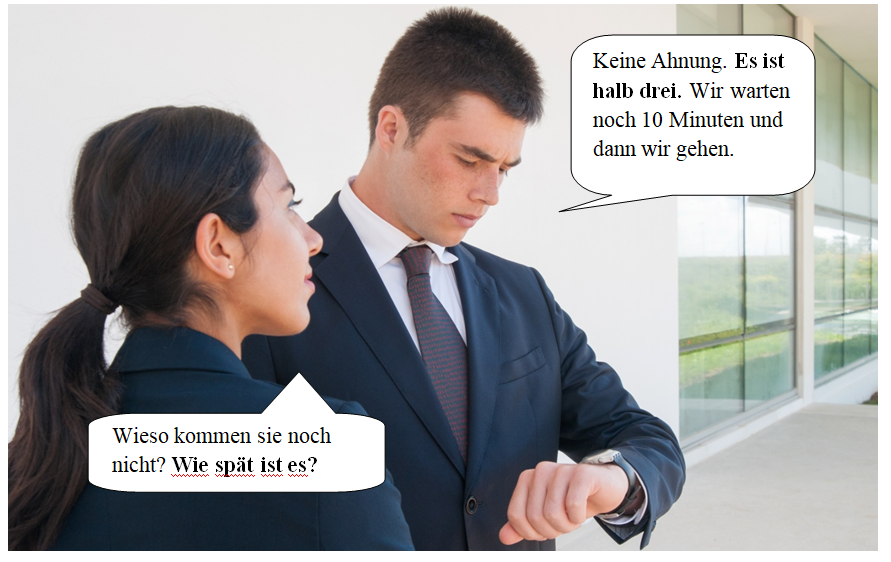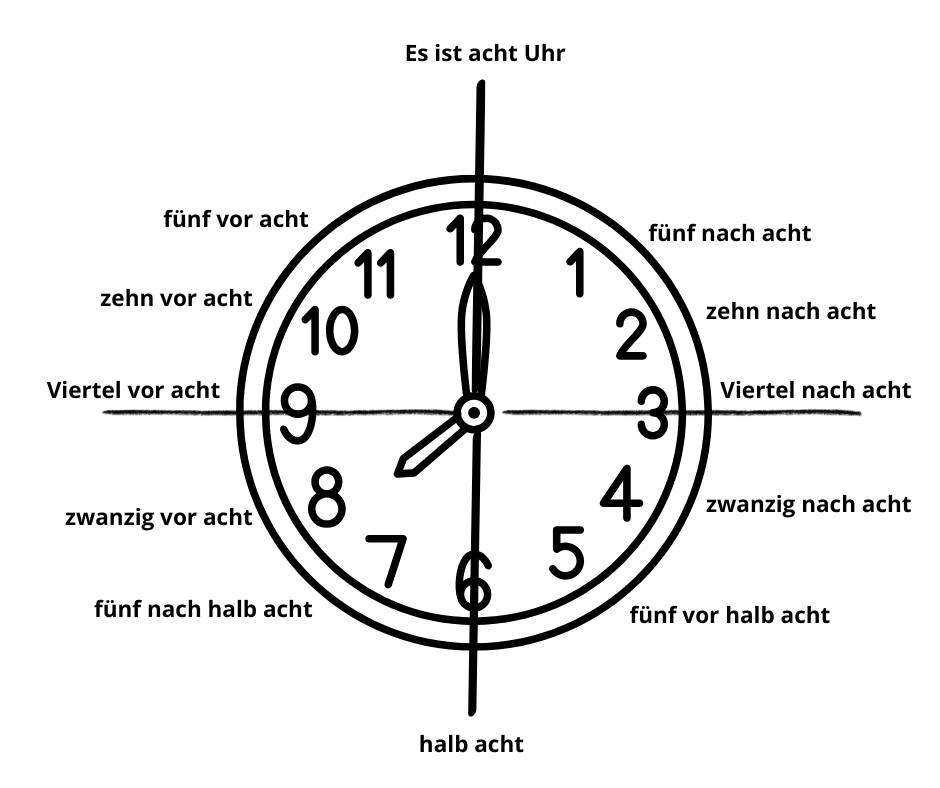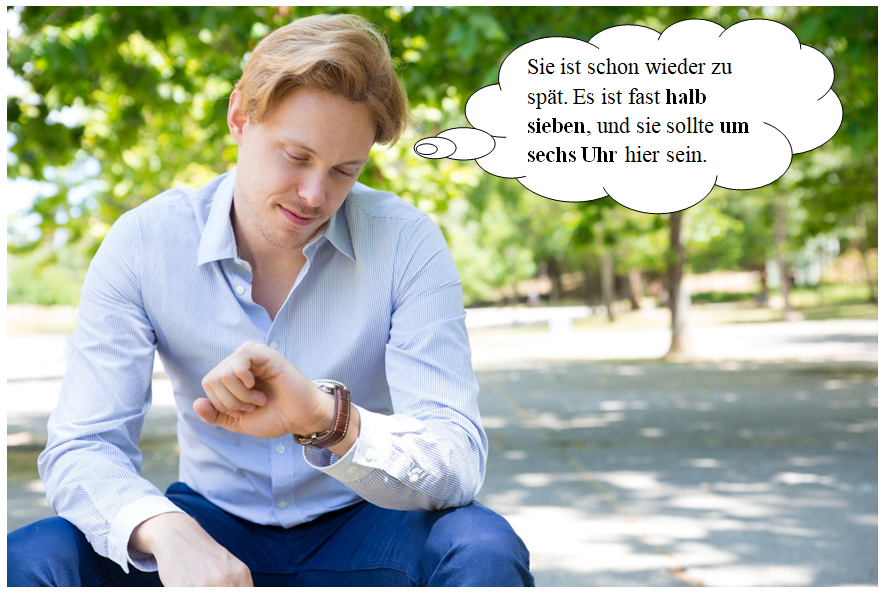In this lesson, you’ll learn how to ask what time it is in German, as well as how to say the time correctly. This lesson is designed for A1-level German learners.
Thank you for reading this post, don't forget to subscribe!
Table of Contents
Question: What time is it?
Private vs. Official Time Usage
How to say and write the time in German
Dialogue: Planning a time
Vocabulary: Key Phrases for Time
Official Time Usage
Asking questions with wann (when)
Dialogue: What are you doing tomorrow?
Business Hours / Öffnungszeiten
Practice exercises
⏰ Question: What time is it?
In German, there are two common ways to ask what time it is:
- Wie viel Uhr ist es? – What time is it?
- Wie spät ist es? – How late is it?
💡 Tip: You can use these phrases both in informal conversations and in official situations.
Wie spät ist es?

📅 Private vs. Official Time Usage
In German, there are two types of time usage: informal (private) and formal (official). Official time is typically heard on TV, radio, and at train and bus stations.
📅 How to say and write the time in German:
| 🕑 Written like this: | 🗣 Pronounced like this: |
| 01:00 Uhr | Es ist ein Uhr / eins |
| 01:10 Uhr | Es ist zehn nach eins |
| 01:15 Uhr | Es ist Viertel nach eins |
| 01:30 Uhr | Es ist halb zwei |
| 01:45 Uhr | Es ist Viertel vor zwei |
| 01:50 Uhr | Es ist zehn vor zwei |
🕓 How to say the time near the full hour in German
In German, time that is a few minutes before or after the full hour is often expressed by the phrases "kurz vor" (shortly before) and "kurz nach" (shortly after).
📌 For example:
10:58 Uhr → (Es ist) kurz vor elf.
📌 In English: It's almost eleven.
11:02 Uhr → (Es ist) kurz nach elf.
📌 In English: It's just after eleven.
💡 Tip: In everyday speech, Germans often use these expressions instead of specifying the exact minutes, especially when referring to the time that is just a little before or a little after the full hour.
🌞 More useful time expressions:
- Es ist Mittag. – It’s noon.
- Es ist Mitternacht. – It’s midnight.
💬 Dialogue: Planning a time
In this dialogue, we will see how time is used in everyday situations:
Mia: Ja? Hallo?
Marko: Hallo, Mia. Hier ist Marko. Hast du am Samstag Zeit?
Mia: Wann denn? Um halb sieben.
Marko: Um halb sieben. Ich mache eine Party. Kommst du auch?
Mia: Nein, ich habe leider keine Zeit. Ich arbeite von 16:00 Uhr bis 22:00 Uhr.
Marko: Am Samstag?
Mia: Ja, ich arbeite manchmal auch am Wochenende.
Marko: Schade.
Mia: Ja, sehr schade. Na ja, viel Spaß am Samstag!
Marko: Danke. Tschüss.

📖 Vocabulary: Key Phrases for Time
Here are some key phrases from the dialogue:
| 🇩🇪 German | 🇬🇧 English |
| Hast du am Samstag Zeit? | Do you have time on Saturday? |
| Ich habe (keine) Zeit. | I have (no) time. |
| Wann denn? | When? |
| um halb sieben | at half past six |
| erst | first |
| leider | unfortunately |
| am Samstag | on Saturday |
| am Wochenende | on the weekend |
| schade | too bad, sorry |
| viel Spaß | have fun |
🏛 Official Time Usage
For official use, time is written in a 24-hour format. Here’s how to express the time:
| 🕑 Written like this: | 🗣 Pronounced like this: |
| 13:00 Uhr | Es ist dreizehn Uhr. |
| 13:10 Uhr | Es ist dreizehn Uhr zehn. |
| 13:15 Uhr | Es ist dreizehn Uhr fünfzehn. |
| 13:30 Uhr | Es ist dreizehn Uhr dreißig. |
| 13:45 Uhr | Es ist dreizehn Uhr fünfundvierzig. |
| 08:50 Uhr | Es ist acht Uhr fünfzig. |
🗓 Asking questions with wann (when)
When you ask a question with wann (when?), the answer usually starts with the preposition um.
📌 For example:
- Wann kommst du? – When do you come?
- Um acht Uhr. – At eight o’clock.
- Um halb vier. – At half past three.
- Um eins. – At one o’clock.
🗣 Dialogue: What are you doing tomorrow?

Leo: Was machst du am Freitag? (What are you doing on Friday?)
Mia: Ich stehe um sieben Uhr auf. (I wake up at seven o’clock.)
Leo: Und dann?
Mia:Ich frühstücke um halb acht. (I have breakfast at half past seven.)
Leo: Und dann?
Mia:Dann nehme ich den Bus um Viertel nach acht. (Then I take the bus at a quarter past eight.)
Leo: Wann kommst du ins Büro? (When do you come to the office?)
Mia: Um halb neun. (At half past eight.)
Leo: Wann kommst du nach Hause? (When do you come home?)
Mia: Um zehn vor vier. (At ten to four.)
🏪 Business Hours / Öffnungszeiten
- Wann ist die Erste Bank geöffnet? – When is Erste Bank open?
- Von 8 Uhr bis 17 Uhr. – From 8 AM to 5 PM.
- Wann ist die Praxis Medic geöffnet? – When is Medic practice open?
- Von 8:30 Uhr bis 16:30 Uhr. – From 8:30 AM to 4:30 PM.
- Wann ist das Konzert? – When is the concert?
- Von halb neun bis zwölf. – From half past eight to twelve.
📝 Practice exercises
- What time is it in German? 1
- What time is it in German? 2
- Dialogue: What are you doing tomorrow? Practice the phrases
- Time planning. Practice the phrases
- Opening hours – Useful phrases
✅ Conclusion
This lesson covers basic phrases and expressions for talking about time in German. If you have any further questions or would like additional practice, please don’t hesitate to ask.

